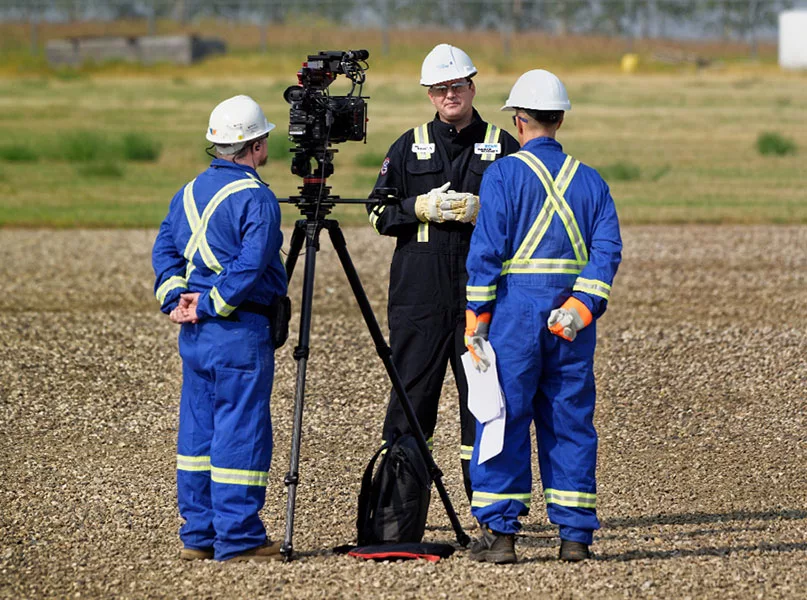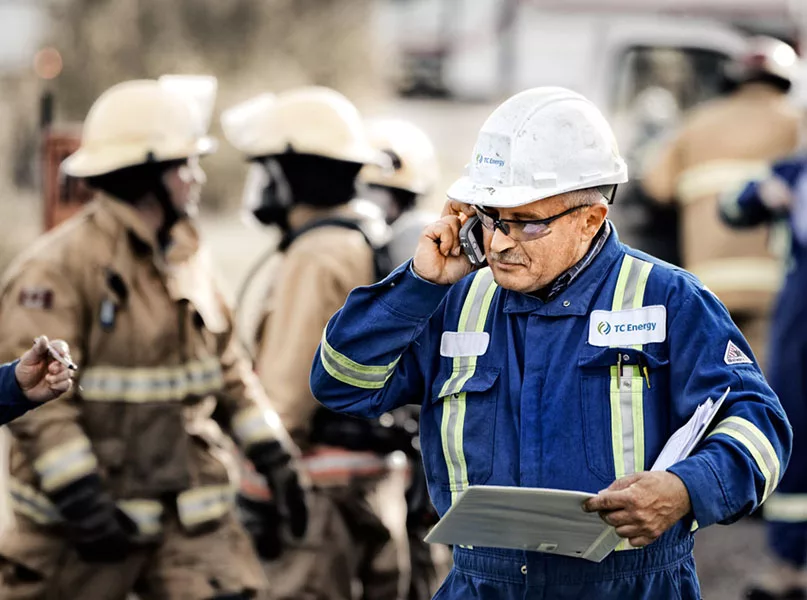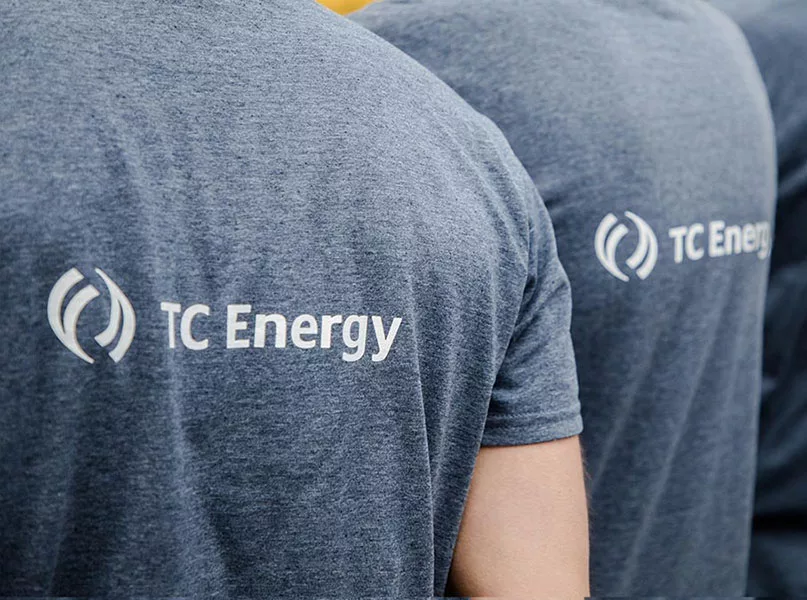For more than 70 years, TC Energy has proudly operated pipelines, storage facilities and power-generation plants that support life in Canada, the US and Mexico. We dig deeper with Vice President of Energy Transition Technologies, Roland Muwanga.
ENERGIZING A TRANSITIONAL FUTURE
The US, Canada and Mexico are uniquely positioned to deliver safe, reliable, and affordable energy solutions to the world while meeting the rising global energy demand.
North America possesses the capability to spearhead the clean energy transition due to its vast natural resources, its geographic location as it relates to Europe and Africa to the east, and Asia to the west, and also because much of the cutting-edge innovation being developed is produced in the continent itself.
“In terms of the current state of the energy industry, we are already seeing a resurgence of coal-fired generation, especially in Asia at present. This was the single largest reason for a more than 40 percent overall increase in growth of global emissions in 2021,” begins Roland Muwanga, Vice President of Energy Transition Technologies for TC Energy.
At the same time, previously decommissioned coal-fired generation is being fired back up in Europe, in order to tactically address the growing energy crisis due to recent geopolitical events. Liquefied natural gas (LNG) is an important part of the solution and will help reduce global emissions to deliver safe and affordable energy that meets the world’s requirements.
TC Energy has built an incredibly strong and diversified portfolio of energy assets across North America, including natural gas pipelines, oil pipelines, power generation, and renewable energy projects.
Additionally, the company has recently made a first-of-its-kind investment to bring natural gas from Texas to Mexico, further strengthening the region’s economy and positioning North America as the world leader in energy solutions.
Furthermore, TC Energy now boasts a 48.4 percent ownership stake in Canada’s first private nuclear generator, Bruce Power, which provides 30 percent of Ontario’s electricity and employs more than 4,000 full-time employees, all while providing safe energy with zero carbon emissions.
“Our commitment is to invest in new technologies and approaches to improve the efficiency, reliability, and sustainability of the world’s energy infrastructure,” sets out Muwanga.
“We’re a team of energy problem solvers working to move, generate, and store the energy North America relies on. Today, we’re taking action to make that energy more sustainable and more secure,” he continues.
TC Energy continues to focus on innovating and modernizing to reduce emissions from its business, alongside delivering new energy solutions – from natural gas and renewables to carbon capture and hydrogen – to help other businesses and industries decarbonize too.
Along the way, TC Energy invests in communities and partners with its neighbors, customers, and governments to build the energy system of the future.

AN INDUSTRY IN TRANSITION
With North America’s abundant source of natural gas supply at its disposal, TC Energy utilizes this wealth of resources to meet the growing global demand for energy and help enable and accelerate the energy transition, especially in critical areas of the Gulf Coast, Europe, and Asia.
“The choice has always been and still is, who produces the gas, not the fuel source. Europe chose Russian gas, and now we are seeing an energy crisis stacked into a climate crisis. Prior to the invasion of Ukraine, Russia supplied 40 percent of Europe’s natural gas. Canada has the cleanest, most sustainably produced source of natural gas – we just need to get more of it to the market,” explains Muwanga.
TC Energy is committed to building and operating safe and reliable energy infrastructure. This includes its 93,300 kilometer (km) network of natural gas pipelines, which supplies more than 25 percent of the clean-burning natural gas consumed daily across North America to heat homes, fuel industries and generate power.
The world needs a diverse energy supply that includes all forms of energy, and TC Energy works every day to deliver those solutions despite an increasingly complex geopolitical environment.
“If we force energy suppliers to embrace forms of energy that today are affordable and sustainable, with reliability being the other most important factor, our world can end up going backwards. TC Energy has a continental network of irreplaceable infrastructure, and in this way, we are effectively building the energy solutions of the future,” Muwanga adds.
Allowing for the development of modern resources, TC Energy’s infrastructure projects will unlock the potential for cleaner gas, while at the same time creating the foundation for expanding hydrogen and other new energy sources that need to be moved safely and efficiently from producers to consumers. By so doing, it aims to achieve a balance of energy security with energy evolution.
Muwanga believes that North America has an opportunity to grow and strengthen its economy through a combination of cooperation and collaboration.
“Properly empowered, North America can serve as the most impactful, collective producer and innovator in the world across a range of energy sources.”
The geography in North America offers a unique and dynamic reach, and sustainability is anchored on finding solutions that protect the planet, empower people, and create shared prosperity.
TC Energy has set ambitious targets to reduce its greenhouse gas (GHG) emissions intensity by 30 percent by 2030 and has positioned its operations to achieve net zero emissions by 2050.
The company plans to achieve this by modernizing its systems and assets, and decarbonizing its energy consumption by driving digital solutions and technologies and continually evaluating opportunities to invest in low-carbon energy and technology.
“Properly empowered, North America can serve as the most impactful, collective producer and innovator in the world across a range of energy sources”
Roland Muwanga, Vice President of Energy Transition Technologies, TC Energy

CAPITALIZING ON RESOURCE POTENTIAL
TC Energy’s path to balancing the global energy transition and continued energy security encounters a maze of challenges, as the company looks to solve the complex technical questions and soaring demand for energy worldwide resulting in continued energy security on a global basis.
North America possesses the resources and the innovative workforce to solve both of these complex challenges. However, at present, there is currently one crucial piece of the puzzle missing, as companies such as TC Energy lack one critical component: energy policies that enable the ability to safely and securely unlock the global energy transition.
To fulfill the potential of delivering transformative global solutions, TC Energy, as well as the entire industry, must start thinking smarter and more creatively, with two ideas that should serve as the initial foundation.
Firstly, sustainable energy policy must focus on addition rather than subtraction.
A small but vocal class of policymakers and interest groups demand that the industry uses regulation to rapidly choke the supply of natural gas to coerce the development of lower-emitting alternatives. However, this concept ignores the real-world consequences.
Traditional energy sources remain critical to keeping pace with the increasing demand. Even using the most optimistic estimates for the growth of renewable energy, blocking the development of traditional energy projects will undoubtedly lead to disruptive energy shortages and soaring costs across North America.
At the same time, these policymakers and interest groups refuse to support the building of newer and cleaner traditional energy projects, like LNG, which has the adverse effect of forcing consumers to rely on older energy sources such as coal which produce far more emissions.
This sequence continues to unfold across Europe to this day. In the chaotic scramble to replace Russian gas, leaders are now seeking refuge in more accessible sources of energy regardless of their environmental impact. Germany, for example, recently reopened or extended more than 20 coal-fired power plants to meet demand this winter. Subsequently, this creates vast insecurity across the region and prevents all progress in aiding the drive toward sustainable energy solutions.
There are no shortcuts possible in the global energy transition. Continuous access to affordable and reliable energy will prove essential as companies such as TC Energy safely and securely progress towards the ability to meet demand with lower-emitting sources of energy.

EMBRACING LNG
LNG is unquestionably the world’s best tool for rapidly reducing worldwide emissions. The LNG that TC Energy exports around the world helps to reduce the immense reliance on coal, which was responsible for a large portion of the overall growth in global carbon emissions last year and in 2021.
LNG has received a surge of attention amid Europe’s energy crisis, but its potential stretches far beyond the current moment into the future of energy. From Mexico to Asia, expanding LNG will continue to maximize energy security and most crucially, it will dramatically reduce emissions. In this way, refusing to expand LNG exports locks nations around the world into coal, high-sulfur diesel, and other damaging energy sources for potentially decades to come which could bring devastating consequences.
TC Energy recognizes that its policies must acknowledge that climate change is a global dilemma to solve. Achieving even a small decline in domestic emissions does not constitute progress if it then triggers a net increase in global emissions.
Unfortunately, restrictive policies continue to prevent TC Energy from securely building the energy infrastructure needed to deliver lower-emitting energy to consumers across North America and around the world. The US still leads the way in global LNG exports, yet there is currently still not enough existing infrastructure to meet global demand.
Allowing for the development of modern energy infrastructure projects will unlock the potential for cleaner gas, while at the same time creating the foundation for expanding hydrogen and other new energy sources that need to be moved safely and efficiently from producers to consumers. This is how TC Energy plans to balance energy security with the energy transition.
The company hopes that policymakers will take several important steps — from fixing the broken permitting process to reassessing how energy projects are categorized, although the most important shift is to change the collective mindset of the industry to focus on safely and securely cultivating an abundance of lower-emitting options rather than imposing scarcity and passively hoping for the best.
The quest to identify influential voices to reject archaic and oversimplified political debates and embrace a more enlightened approach to delivering energy security and fulfilling collective climate goals must become a fundamental priority for the energy sector in order to provide continued stability.
It will take strong leaders across the entire industry with vision, insight, and courage to confront this challenge and enable a secure and sustainable energy future.

EMBRACING THE FUTURE OF ENERGY
TC Energy’s portfolio recognizes and emphasizes an inclusive approach to energy solutions, and its natural gas and oil infrastructure plays a critical role in the global energy transition.
“Our existing pipelines and energy storage capacity is one of the largest in North America and positions TC Energy as the continent’s energy problem-solving leader,” acclaims Muwanga.
Whether it’s renewable energy, renewable natural gas (RNG), hydrogen, or other low-carbon energy services, TC Energy utilizes its North American presence to offer its many customers flexible, cost-effective solutions to effectively manage their energy and decarbonization needs.
For example, the Alberta Carbon Grid is a significant step in the transition to a low-carbon energy system and to reduce GHG emissions in the province of Alberta, Canada, by integrating large-scale renewable energy sources and other clean technologies into the grid.
This project will reduce Alberta’s reliance on fossil fuels, which are the main source of GHG emissions, and help the province reach its target of reducing emissions by 30 percent below 2005 levels by 2025. Additionally, the integration of renewable energy sources will improve the reliability and stability of the electricity grid and provide the area with access to cleaner and more affordable energy.
In addition to this, TC Energy is focused on co-developing, constructing, operating, and owning large-scale hydrogen production facilities in the US and Canada. Hydrogen is a clean energy source that can be used to replace fossil fuels and reduce GHG emissions, and H2 production hubs can help increase the production and use of hydrogen as a fuel, which contributes to reducing the carbon footprint of various industries.
“Hydrogen can be stored and used as an energy carrier, making it a valuable resource for energy storage. The production hubs will help store excess energy from renewable sources, such as wind and solar, that can be used in times when energy demand is higher. Plus, it has numerous industrial applications, such as in the production of chemicals and the refining of oil,” Muwanga elaborates.
Another example of the company’s proactive mentality when it comes to new initiatives is the $29.3 million investment in a renewable natural gas production facility near the Jack Daniels Distillery in Lynchburg, Tennessee.
The facility will produce RNG with a carbon intensity score that is 50 percent lower than traditional natural gas, impressively saving up to 16,000 tons of CO2 per year.
“Our existing pipelines and energy storage capacity is one of the largest in North America and positions TC energy as its leader in energy problem solving”
Roland Muwanga, Vice President of Energy Transition Technologies, TC Energy

POWER GENERATION FACILITIES
TC Energy’s asset base of high-quality, long-life energy infrastructure includes investments in seven power generation facilities with a combined generating capacity of approximately 4,200 megawatts (MW) – enough to power more than four million homes.
At present, approximately 75 percent of the company’s power capacity is emission-free, and TC Energy remains a leader in the development and operation of high-efficiency, natural gas-fired generating stations. This is alongside a robust origination and trading platform in the US and Canada.
As the demand for renewable electricity continues to increase across North America, new hydro, solar, wind and energy storage capacity will be needed to meet the growing requirements and support a shift in the energy mix. TC Energy is, however, well positioned to capture these opportunities given it has more than 20 years of vast experience in the power business and the multiple projects and opportunities that it has completed, with a multitude of new initiatives underway.
The Bear Creek Cogeneration Plant is a great example of how power innovation can benefit communities while generating value for shareholders. The plant produces up to 100 MW of electricity for both Weyerhaeuser’s Grande Prairie Pulp and Sawmill and Alberta’s competitive electricity market.
The Bear Creek facility imports biomass-derived steam from wood waste and then combines it with natural gas-derived steam to power a turbine. The turbine generates energy for the mill, supplies electricity to the power pool of Alberta and reduces wood waste destined for landfill.
ENGAGING WITH COMMUNITIES
As well as building pipelines and power plants, TC Energy often describes itself as a pipeline operator or energy producer. However, the one thing that the company builds more than anything else is long-lasting relationships, with governments, communities, landowners, Indigenous groups, suppliers, vendors, contractors and the public.
Safe, reliable and sustainable operations are foundational to what TC Energy does – located within the beating heart of the company culture and in every element of its decision-making. This process of responsibility starts with the core values of safety, innovation, responsibility, collaboration and integrity, and TC Energy upholds these values in its commitments to protect the planet, create shared prosperity, and vitally, empower people.
Building and maintaining positive relationships with communities in areas such as Pike River and Saint-Sébastien, and cultivating meaningful partnerships with leaders including the likes of Saint-Sébastien Mayor Martin Thibert, are highly important to TC Energy.
The combination of core values provides a solid foundation for the company’s ongoing commitment to its stakeholders. These values guide TC Energy at all times in its interactions with partners and local communities, as the company listens to their concerns and incorporates their valued feedback into all future project planning.
TC Energy abides by several key principles: to identify and consider the perspectives of stakeholders, remain visible, present and approachable in the community, recognize that diverse thoughts, opinions and experiences contribute to better decisions and outcomes for everyone involved, take ultimate ownership and accountability for its decisions and outcomes, and finally, to track, measure and report on its performance in order to then learn and improve.
While TC Energy has built strong relationships with thousands of communities, backed by generations of carefully nurtured cooperation and trust, the company is also committed to earning public confidence from those communities that it has not yet worked with.
The list of company stakeholders includes people or groups that significantly affect or may be affected by TC Energy’s business activities, be it directly or indirectly. Whether they are local community members, landowners or Indigenous groups – who are justifiably recognized as rightsholders with a distinct relationship to the land – TC Energy is committed to building mutually beneficial relationships with all its neighbors.
Throughout the entire life cycle of a project, TC Energy engages with communities from project approval to the decommissioning stages.
By engaging early and often with stakeholders, the company creates project plans with better outcomes for everyone involved. Engaging with stakeholders means listening to the needs of all associates, providing accurate information, and responding to stakeholder interests in a prompt and consistent manner.
Some of the ways TC Energy works to identify potential environmental and socio-economic effects are through hosting local open houses, conducting public presentations, and having one-on-one discussions.
This is as well as reaching out to stakeholders with fact sheets, brochures, website access and providing email and toll-free phone lines to contact the company directly.
Once new assets are operational, the engagement with stakeholders doesn’t end, however.
“Our regional community liaisons continue to build and maintain relationships with our stakeholders and focus on community relations, public awareness, emergency response and community investment activities throughout the life of the asset,” confirms Muwanga.

COLLABORATING WITH INDIGENOUS GROUPS
For more than 40 years, TC Energy has been engaging and collaborating respectfully with Indigenous groups in its areas of operation.
After such a long and prosperous working relationship, TC Energy recognizes Indigenous groups as rightsholders who have a distinct relationship to the land, as well as understanding that its business activities have the serious potential to affect these groups in tangible ways. Indigenous engagement and participation are therefore critical to the success of the company’s projects.
Committed to working with Indigenous groups and tailoring its engagement approach to be responsive to the unique circumstances of each group, TC Energy provides resources to Indigenous groups during the engagement process to support their participation in a project’s regulatory approval process.
Through active participation in activities like fieldwork and traditional land use studies, Indigenous groups then make their own assessment of a project’s potential effects on the community and natural environment.
In some cases, participation agreements or project equity agreements are other ways that TC Energy works closely with Indigenous groups that are potentially affected by its activities to acknowledge their unique governance, relationship to the land and legal standing.
TC Energy’s Indigenous Relations team engages early and often with potentially affected Indigenous groups to understand their interests, identify opportunities, respond to their concerns, and facilitate participation and inclusive collaboration across new projects.
This is achieved by identifying and creating opportunities that support these groups through education and training, community legacy, scholarships and engagement with Indigenous contractors and businesses.
By working together and ensuring open communication with Indigenous groups, the company strives to earn their respect and trust to establish and grow positive long-term relationships, which will benefit both parties long-term.
To ensure Indigenous cultures, values and the environment are respected and protected, TC Energy engages with local Indigenous groups to identify and gather Indigenous knowledge, helping to guarantee the needs and interests of each group are met throughout the life cycle of the project.
These engagements additionally provide an opportunity to discuss concerns and mitigate any potentially adverse effects by incorporating Indigenous knowledge about the local ecology, land and resource use, into all project planning activities.
SUPPORTING SUPPLY AND GROWTH
As well as its focus on working with local communities and Indigenous groups, TC Energy endeavors to place great importance on building and maintaining relationships with the contractor, supplier and vendor community in which it is deeply engaged.
“We rely on our supply and contractor community to support our day-to-day operations and help us achieve our vision to be the leading infrastructure company in North America,” Muwanga tells us.
Similarly, TC Energy is also committed to providing the tools and resources that contractors, suppliers and vendors need to support its business objectives and the company’s core values of safety, integrity, responsibility and collaboration.
“For more than 70 years, we’ve delivered on our commitment to meet the ever-increasing demand for energy in a safe and sustainable manner. We’ve provided significant value to our shareholders with an 11 percent average annual return since 2000 and increased our dividend each year since.”
Achieving excellent levels of growth and development is the reward reaped by TC Energy as a result of its commitment to efficiency and the overall quest to be a true industry leader in its field.
Whilst impressively growing its asset base from $25 billion to over $100 billion, TC Energy has simultaneously raised its annual dividend from $0.80 per share to $3.72 per share in 2023, placing the company in a position of exceptional financial strength moving forward.
“For more than 70 years we’ve delivered on our commitment to meet the ever-increasing demand for energy in a safe and sustainable manner”
Roland Muwanga, Vice President of Energy Transition Technologies, TC Energy
A FOCUS ON SAFETY AND OPERATIONAL EXCELLENCE
Operational excellence starts with safety, and TC Energy has set clear goals regarding this crucial element of running a thriving business.
These operational non-negotiables include keeping people, the environment and the company’s assets safe every day. In addition to this, serious or critical incidents are never acceptable to the company, and in the rare instance when an incident occurs, TC Energy is committed to doing what is right throughout the response, recovery, and remediation phases immediately following such an occurrence.
The company takes this responsibility incredibly seriously, which recently included resolving the Milepost 14 incident on the Keystone Pipeline System in Washington County, Kansas. As of February 2023, TC Energy has recovered 90 percent of the released volume, whilst continuing to diligently work to restore the area to its original condition and investigating the root cause of the breakage which will be applied to learnings going forward.
As part of the company’s focus on operational excellence, TC Energy continues to look for new ways to maximize the value of its copious operating assets by optimizing system availability and throughput as well as commercial terms with all its customers. This is alongside scrutinizing the organization to find additional cost efficiencies, aiming to get the best value possible and reducing costs without ever compromising on safety.
Complementing TC Energy’s refusal to compromise on safety, is its dedication to looking after its staff.
“We know our people perform at their best when they feel safe, valued and respected. We strive to foster an open and equitable environment where each member of our team feels a sense of belonging – a place where they are empowered to express themselves and their ideas,” Muwanga tells us proudly.
“When we bring different people, ideas, backgrounds, opinions and skills to the table, we make better decisions, achieve better outcomes and create a better place to work for everyone.”
“We strive to foster an open and equitable environment where each member of our team feels a sense of belonging”
Roland Muwanga, Vice President of Energy Transition Technologies, TC Energy

ESG PRACTICES
Broadly, TC Energy strives to be a leader in the delivery of energy in a safe, responsible and sustainable manner, ensuring the company is positioned to maximize long-term value creation.
Being a leader involves listening to stakeholders and communicating candidly about the company’s performance and approach, aiming to provide comprehensive and material disclosure on TC Energy’s environmental, social and governance (ESG) management.
“Our vision is to be the premier energy infrastructure company in North America today and in the future. That future includes embracing the energy transition that is underway and contributing to a lower-carbon energy world,” Muwanga outlines.
TC Energy believes today’s energy industry must play a proactive role to enable change and help meet each country’s climate goals. This must be achieved whilst making sure that a growing population continues to have the energy required to maintain an optimum quality of life — transportation, agriculture, healthcare, education, and economic prosperity all depend on access to safe, reliable, and affordable energy.
In that vein, TC Energy takes its role as a socially responsible corporate leader very seriously. One example of this is the Build Strong program which invests in organizations that are vital to local communities and the business itself.
“Whether we are providing grants to organizations, awarding scholarships to future energy problem solvers or supporting local events that bring community members together, our goal is to help build strong, vibrant communities through mutually beneficial relationships,” affirms Muwanga.
For TC Energy, evolving to a lower-carbon energy future is a serious obligation, not an imposition or an obstacle – it is an incredible opportunity, serving as a catalyst for future growth for the company with investments that are strongly aligned with its corporate strategic objectives, traditional risk preferences and core values.
There is both an extraordinary opportunity and a need for accountability to play a vital role in the energy transition. In this regard, TC Energy remains confident that it can make a difference thanks in large part to its innovative workforce, asset footprint and the trusted relationships it has built with stakeholders, rightsholders and partners.
FOCUSED ON TODAY, PREPARING FOR THE FUTURE
It’s an indisputable fact that TC Energy’s team of more than 7,000 dedicated energy problem solvers make the company’s ever-growing list of achievements possible, as the business continues to move, store and generate the energy that North America, and ultimately the world, relies on today – while finding new, more secure and sustainable solutions for tomorrow.
“We believe an all-of-the-above strategy is required, as are innovation, collaboration and world-class expertise. These essential skills are widespread throughout our organization and, when combined with our robust strategy, continue to position us for long-term success,” observes Muwanga.
Guiding these intricately strategized efforts is TC Energy’s increasingly diverse Board of Directors, who bring a variety of perspectives, backgrounds and experiences to the table.
As part of its continual succession planning, the company recently welcomed Dheeraj Verma and Cheryl Campbell to the Board.
Appointed in April 2022, Verma brings considerable expertise in capital market transactions and energy investment. Campbell, who was appointed in June 2022, offers extensive experience in the midstream energy sector, with operational expertise in both regulated and unregulated environments, as well as in sustainability and risk management. Both members were specifically acquired by the company to provide valuable contributions to TC Energy’s corporate strategy and governance.
Entering the remainder of 2023 excited to develop and expand its portfolio of energy solutions, TC Energy’s unique blend of deep experience and strong relationships with partners and customers positions itself favorably to help solve the global challenge of meeting rising energy demand while working in parallel to significantly reduce emissions.
The sturdy financial discipline and recently announced capital rotation program will enable TC Energy to prudently fund and manage its assets and opportunities across its ever-expanding existing footprint into the next segment of the company’s prosperous story.
Meanwhile, the company-wide emphasis on safe, efficient and disciplined operations will deliver results for employees, customers and shareholders, while setting a strong foundation for robust and sustainable growth that will secure TC Energy’s place in the dazzlingly bright and sustainable energy future.
TC ENERGY PARTNERS





















































